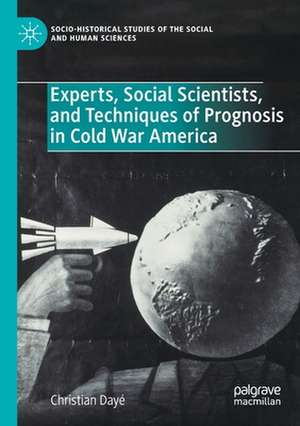Experts, Social Scientists, and Techniques of Prognosis in Cold War America: Socio-Historical Studies of the Social and Human Sciences
Autor Christian Dayéen Limba Engleză Paperback – 17 ian 2021
Based on archival research and interviews, the chapters explore the history of this series of experiments to understand how contemporary social scientists conceived of one of the core categories of the Cold War, the expert, and uncover the systematic use of expert opinions to craft prognoses.
This consideration of the expert’s role in Cold War society and what that can tell us about the role of the expert today will be of interest to students and scholars across the history of science, the sociology of knowledge, future studies, the history of the Cold War, social science methodology, and social policy.
| Toate formatele și edițiile | Preț | Express |
|---|---|---|
| Paperback (1) | 467.46 lei 6-8 săpt. | |
| Springer International Publishing – 17 ian 2021 | 467.46 lei 6-8 săpt. | |
| Hardback (1) | 642.18 lei 6-8 săpt. | |
| Springer International Publishing – 17 ian 2020 | 642.18 lei 6-8 săpt. |
Preț: 467.46 lei
Preț vechi: 549.96 lei
-15% Nou
Puncte Express: 701
Preț estimativ în valută:
89.45€ • 93.63$ • 74.45£
89.45€ • 93.63$ • 74.45£
Carte tipărită la comandă
Livrare economică 31 martie-14 aprilie
Preluare comenzi: 021 569.72.76
Specificații
ISBN-13: 9783030327835
ISBN-10: 3030327833
Pagini: 246
Ilustrații: XVI, 246 p. 12 illus.
Dimensiuni: 148 x 210 mm
Greutate: 0.32 kg
Ediția:2020
Editura: Springer International Publishing
Colecția Palgrave Macmillan
Seria Socio-Historical Studies of the Social and Human Sciences
Locul publicării:Cham, Switzerland
ISBN-10: 3030327833
Pagini: 246
Ilustrații: XVI, 246 p. 12 illus.
Dimensiuni: 148 x 210 mm
Greutate: 0.32 kg
Ediția:2020
Editura: Springer International Publishing
Colecția Palgrave Macmillan
Seria Socio-Historical Studies of the Social and Human Sciences
Locul publicării:Cham, Switzerland
Cuprins
1. Introduction: A Culture of Insecurity and its Experts.- 2. Experts, Think Tanks, and the Delicate Balance of Public Trust. - 3. The Wisdom of the Group: RAND's First Experiments with Expert Prediction, 1947-1951.- 4. Negotiating Rules for the Game: Political Games at RAND, 1954-1956.- 5. The Oracle's Epistemology: Expert Opinions as Scientific Material.- 6.The Boredom of the Crowd: The Long-Range Forecasting Delphi, 1963-1964.- 7. Conclusion: The Strength of Epistemic Hopes.
Recenzii
“In the future, historians of social science would be wise to follow Dayé's recommendation to focus more of their work on explicating the historical embeddedness of research methods and techniques. Doing so will not only help us understand the latter on their own terms, but will also provide insight into the important role epistemology plays in shaping Americans' approach to the world.” (Daniel Bessner, Journal of the History of the Behavioral Sciences, July 23, 2021)
Notă biografică
Christian Dayé is Research Fellow at the Science, Technology and Society (STS) Unit of Graz University of Technology, Austria.
Textul de pe ultima copertă
This book describes how Cold War researchers used expert opinions to construct foreknowledge of geopolitical relevance. Focusing on the RAND Corporation, an American think tank with close relations to the armed forces, Dayé analyses the development of two techniques of prognosis, the Delphi technique and Political Gaming.
Based on archival research and interviews, the chapters explore the history of this series of experiments to understand how contemporary social scientists conceived of one of the core categories of the Cold War, the expert, and uncover the systematic use of expert opinions to craft prognoses.
This consideration of the expert’s role in Cold War society and what that can tell us about the role of the expert today will be of interest to students and scholars across the history of science, the sociology of knowledge, future studies, the history of the Cold War, social science methodology, and social policy.
Based on archival research and interviews, the chapters explore the history of this series of experiments to understand how contemporary social scientists conceived of one of the core categories of the Cold War, the expert, and uncover the systematic use of expert opinions to craft prognoses.
This consideration of the expert’s role in Cold War society and what that can tell us about the role of the expert today will be of interest to students and scholars across the history of science, the sociology of knowledge, future studies, the history of the Cold War, social science methodology, and social policy.
Caracteristici
Counters the emphasis on theory in the historiography of the social sciences and seeks to establish new interest in the history of empirical social research Suggests that epistemic hopes describe a social mechanism wherein the wish to do something good causes something bad: the adoption and maintenance of a non-optimal technique Steps back from policy analysis to focus on how expert knowledge is actually produced, offering a unique assessment of tacit assumptions and methodological inconsistencies






